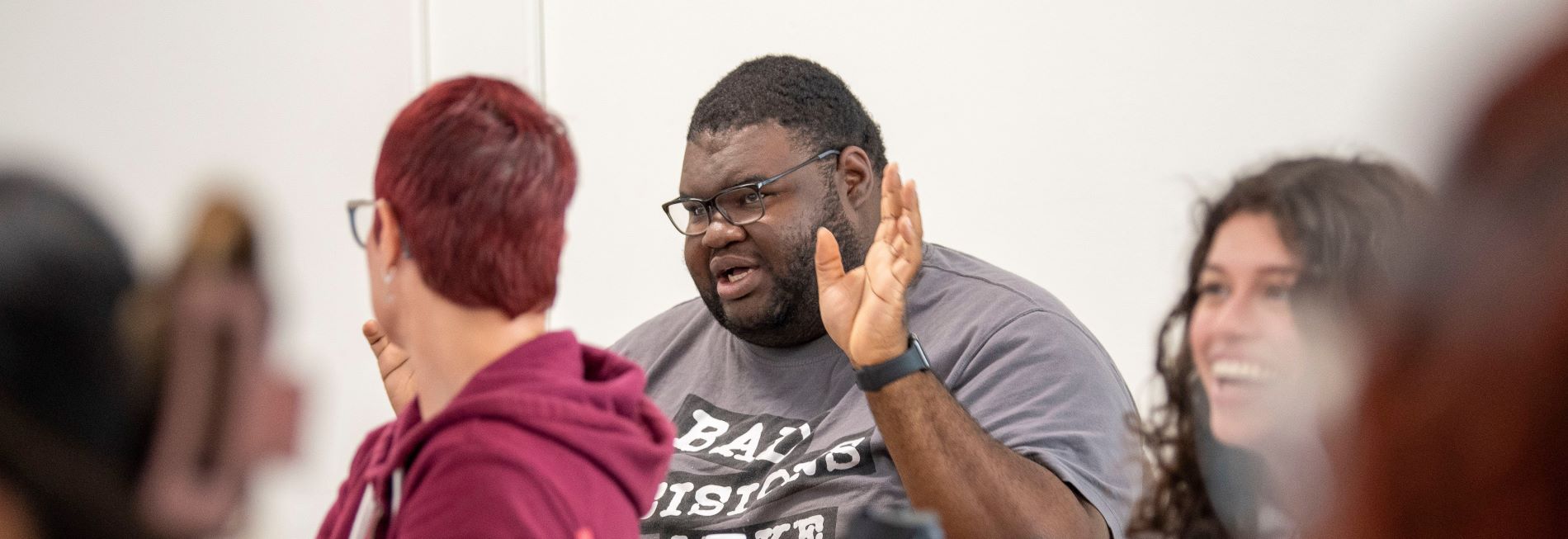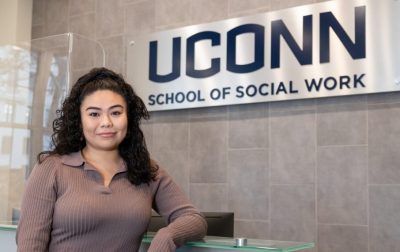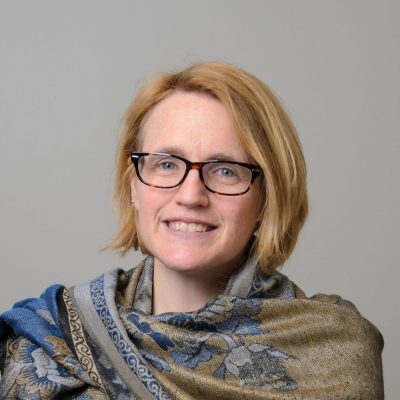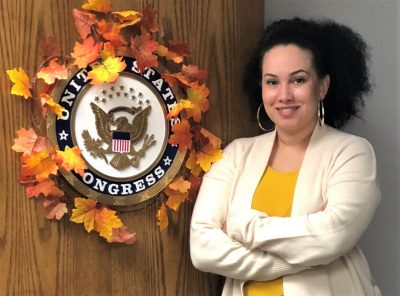
MSW Coursework
At UConn School of Social Work, MSW students have the unique opportunity to pursue a specialized concentration in addition to our foundational curriculum. In the classroom, MSW students acquire and hone skills for a variety of professional settings.
Concentration-Based Curriculum
The UConn School of Social Work offers specialized concentrations to match your interests and career goals. Students can choose one of three areas of concentration: Individuals, Groups, and Families Practice; Community Organizing; or Policy Practice. Explore our concentrations below!
Learn more about MSW Admissions.
Individuals, Groups & Families
Individuals, Groups and Families Practice (IGFP) prepares students to improve the well-being of clients as they empower themselves personally and politically; restore and enhance their social well-being; and resolve challenging life situations.
Through the professional relationship, clients are supported to:
- Strengthen and reach their personal potential
- Understand and cope with specific situations and stressors
- Develop effective forms of self-expression and communication
- Develop positive interpersonal relationships
- Influence their physical and social environments to better meet their needs
- Understand and secure their rights and entitlements
- Utilize personal, interpersonal, and environmental resources
IGFP can be an ideal choice for individuals who are passionate about using their strengths to help others build healthy relationships and create positive change; undergraduates in disciplines such as psychology and human development and family sciences; and working adults who have experience working in social service agencies or as teachers.
IGF social workers may serve in a range of practice settings, public and private, in both urban and rural environments. They may also work to improve access to social services and enhance their quality.
Our alumni find career opportunities in:
- Child welfare agencies
- Family service agencies
- Schools and school districts
- Mental health clinics
- Health care settings
- Youth and children's services
- Community and neighborhood centers
- Criminal justice settings
- Senior centers
- Counseling and therapy practices

"I chose the IGFP concentration because I was confident that it would prepare me to be a well-informed, culturally humble clinician. The courses combined with my field placement where I provide one-on-one and group therapy, have allowed me to gain invaluable experiences and knowledge in behavioral health."
Kelly Sanchez
MSW Student
Community Organizing
Community Organizing (CORG) is one of three specialized concentrations that Master of Social Work (MSW) students can choose as their focus in the degree program. It combines direct service with advocacy, education, and social action to empower individuals to create change in their communities.
Community organizing activities include:
- Building equitable relationships and partnerships with community members
- Shifting power relationships to benefit the community
- Supporting community leaders and leadership development
- Centering individual and community problems within systems that require social change efforts
- Collaborating with communities on needs assessments and identifying solutions
- Increasing access to programs and services
- Identifying strategies to create policy change
- Engaging in outreach and community involvement
- Organizing public meetings and other public actions
- Coordinating and engaging in direct action for social change
- Writing grant proposals and administering programs that serve communities
Community Organizing social workers are people-centered and effective at building relationships to foster change in communities, organizations, and systems. Our alumni serve in a diverse range of settings:
- Community and neighborhood centers
- Nonprofit and advocacy organizations
- Social change coalitions
- Government agencies
- Universities
- Labor unions
- Congressional offices
- Human rights organizations
- International organizations
- Veterans Administration

“UConn School of Social Work was instrumental in my education and development as an organizer. Strong placements, strong classmates and strong connections with faculty are helping build the resources we need to have a stronger more equitable state.”
Gina DeVivo Brassaw, ’02 MSW
Policy Practice
Policy Practice (POPR) concentration prepares students to advocate in organizations and government to improve laws, regulations, and policies that affect vulnerable populations.
This method of social work practice leads to change in public and private institutions and systems to increase equity and improve people's lives. Policy practice activities include:
- Analyzing existing policies and crafting policy proposals
- Administering social programs
- Conducting needs and community assessments
- Using research and data in policymaking
- Writing grant proposals
- Implementing political strategies
- Write legislative policy briefs
Undergraduates in disciplines such as political science, public policy, sociology, urban studies, women's and gender studies, human rights, human development and family sciences, or cultural studies should consider an MSW with a Policy Practice concentration.
Policy Practice students receive a strong foundation in social work and preparation for a professional degree, in addition to skills that promote change in policy and political spaces.
Policy Practice social workers engage in strategies that ensure the political participation of diverse and marginalized people, leading to social change in public and private institutions, organizations and systems.
Our alumni find career opportunities in:
- Public and private not-for-profit agencies
- Connecticut state agencies
- Juvenile and criminal legal settings
- Government and legislative offices
- School districts
- United Nations and international NGOs
- Reproductive and gender rights organizations
- Political seats and staff
- Higher education
- Veterans Administration
 “The Policy Practice concentration transcends common narratives about social work. As a policy practitioner, I make an impact and implement change on a large scale. I chose the UConn MSW program because of the faculty’s range of specializations that ensure a diverse learning experience.”
“The Policy Practice concentration transcends common narratives about social work. As a policy practitioner, I make an impact and implement change on a large scale. I chose the UConn MSW program because of the faculty’s range of specializations that ensure a diverse learning experience.”
Rebecca Washington
MSW Policy Practice Student
Study Options and Program Plans
We understand that many of you have full-time jobs and families of your own, and we make every effort to make your busy life easier. To meet students' scheduling needs, our MSW program offers full-time, part-time, Advanced Standing and online classes.
NEW! Online MSW Program
The Online MSW Program - Fully Online, Part-Time
An Online MSW Promoting Clinical Practice Careers: UConn’s Online MSW program retains the same integrity of our on-campus program. Students can expect a comprehensive overview of social work theory and practice, with a focus on Individuals, Groups, and Families Practice (IGFP). Offering a mix of synchronous and asynchronous classes, part-time, spanning a three-year period, UConn’s Online MSW maximizes flexibility without compromising the quality of education.
To learn more about UConn’s Online MSW and apply, please visit our Online MSW website at https://onlinemsw.socialwork.uconn.edu.
How the Program Works
Begin in the Fall
The program starts in late August. Students take two courses per semester over three years, including practicum education (formerly field education) internships in the last two years.
Program Plan
The Online MSW Program plan outlines the course of study. A minimum of 60 credits is required, including 42 credits in classroom courses and 18 credits in field education. Course offerings are subject to change.
Full-Time, 2-Year Program
Most MSW students are engaged in full-time study and obtain their degrees in two years. Students select from daytime or evening course options. Students in the full-time program take their required practicum placement requirement during both years.
Review our Program Plans for full-time, two-year students.
Part-Time Program: 3-Year and 4-Year Plans
For economic, personal, or educational reasons, some students choose not to complete the program in the typical pattern of two years of full-time study. In these situations, students may opt for the part-time program options, in which they may take up to four years to earn their degree.
Part-Time Three-Year Plan
Students would complete coursework during only the first year of the program, taking an average of three classes per semester. In the final two years, students will take practicum education.
Part-Time Four-Year Plan
Students would complete coursework during the first two years of the program, with an average of two classes per semester to lighten the load. Students will take practicum education in the final two years.
Review our Program Plans for part-time students.
Part-Time Cohort Program: 3-Year Plan
The MSW Part-Time Cohort Program provides students with the opportunity to complete their MSW degree in 3 years with a cohort of approximately 12-20 students. Students will take an average of three courses per semester.
A cohort program is one in which the same group of students take the same courses and work together all the way through to receiving their degree. This offers the predictability and consistency of learning among the same group of people. In this program students take a fixed schedule of evening and some weekend courses, which provides flexibility for those who have obligations during daytime hours. Only students that select the Individuals, Groups, and Families (IGFP) concentration will be able to participate in the Part-Time Cohort Program. Students will take the practicum placement requirement in the final two years of their program. The practicum placement would primarily occur during the hours of 9-5.
Seats for this Part-Time Cohort Program are limited. Therefore, we encourage applicants to apply sooner rather than later.
Review our Program Plan for Part-Time Cohort students.
Advanced Standing, Part-Time and Full-Time
Advanced Standing is designed for individuals who have graduated within the last six years from an undergraduate social work program accredited by the Council on Social Work Education (CSWE). If you have a cumulative GPA of 3.0 or higher (3.5 preferred), this may be an opportunity for you to earn your MSW degree in less than one year, or in 18 months. Read more about Advanced Standing.
Review our Program Plans for Advanced Standing students.
Connecticut ¡Adelante!
This new MSW scholarship program is designed to increase the number of bilingual social workers trained to meet the mental health needs of Latino/a/e families in Connecticut. Students who are enrolled in our MSW program can apply for Connecticut ¡Adelante! Accepted students are eligible to receive $2,500 in tuition assistance each semester during the two-year program, for a total of up to $10,000.
Read more about Connecticut ¡Adelante!
Review our Program Plan for Connecticut ¡Adelante! students.
Students applying for Connecticut ¡Adelante! can also apply for the School Social Work Program, which provides tuition assistance to eligible, matriculated students.
Watch the NBC CT stories, in English and in Spanish, about Connecticut ¡Adelante!
If you have questions about the program, contact Eunices Pineda or Lesly Sanchez-Villar.
School Social Work Program
The School Social Work Program, supported through a grant from CT Health Horizons, aims to increase the number of MSW students prepared to enter the field of school social work. First- and second-year MSW students are eligible to apply.
Only students enrolled in our MSW program can apply for the School Social Work Program. Accepted students are eligible to receive a $10,000 stipend during any year in the program (first, second or Advanced Standing). MSW graduates will be reimbursed $250 for fees paid to pursue their Initial Educator Certification.
Read more about the School Social Work Program.
Students can also apply for the Connecticut ¡Adelante! program, which provides tuition assistance to eligible, matriculated students in the IGFP (Individuals, Groups, and Families) concentration.
If you have questions about the School Social Work Program, please contact Eunices Pineda.
Department of Children and Families (DCF) Cohort Program
This program is designed to increase the DCF workforce with professionally trained MSW-level staff. DCF employees will be able to complete their program in a five-semester, work-friendly format. Interested applicants must apply for spring term to the individuals, groups, and families concentration in order to be eligible for this program. If admitted, acceptance to the DCF internship program is not guaranteed.
Learn more about our MSW Program Plans and Graduate Course Descriptions.
Read the NBC CT story about the program and recent graduates.
For MSW/DCF Cohort Program questions, contact:
- UConn School of Social Work: Milagros Marrero-Johnson at milagros.marrero-johnson@uconn.edu
- DCF: Kristine Rivera at kristine.rivera@ct.gov
Scholars in Aging
Through a generous gift from a donor, the School of Social Work established the Scholars in Aging Program in 2022. This stipend-based internship program prepares Master of Social Work (MSW) students with specialized classroom and practicum training to serve the growing number of adults aged 65 and older within diverse communities and institutional settings.
The program will accept a cohort of eight students who have a strong interest in working with adults aged 65 and older. Priority consideration will be given to MSW advanced-year students who have chosen the Individuals, Groups and Families concentration; available spaces will be filled on a first-come, first-served basis.
Review our Program Plans for students.
Read more about this program at the Scholars in Aging page and also at UConn Today.
Summer Block
The School of Social Work offers a block second-year placement for qualified Individual, Group, and Family Practice (IGFP) students. In this arrangement, students complete their advanced year practicum placement over the summer, from early May to late August. Students also take the final two concentration courses (IGFP 5302 and 5303) concurrently with the block placement.
Students in Summer Block should have successfully completed all but the final two concentration courses by the time they begin the block placement. Learn more about how to apply for Summer Block.
Non-Degree Program
If you are ready to move ahead with your career, but not ready to return to school full-time, the Non-Degree Program is for you. You can earn credits toward your degree prior to admission. The Non-Degree Program allows you to earn a maximum of 15 credits toward your MSW degree. Learn more about the Non-Degree Program here. Please note that non-degree status does not constitute, guarantee, or imply admission or readmission into any program at UConn.
Coursework
MSW students have the opportunity to gain foundational and specialized knowledge from a wide range of innovative courses, taught by our expert faculty. Explore our course descriptions for our:
Dual and Joint Degree Programs
Students who wish to graduate with two college diplomas either at the same school or an affiliated university can pursue a dual or joint degree. This option allows students to finish both degrees in less time, compared to earning each degree independently. Students must be enrolled concurrently in both schools and earn both degrees simultaneously to benefit from this arrangement.
Reflecting the School’s commitment to interdisciplinary teaching, practice, and research, dual and joint degree programs offer students an opportunity to seek degrees in two professions simultaneously. Students must apply separately and be admitted to each school. Candidates are encouraged to apply and begin both programs at the same time; however, a student may apply prior to the completion of their first year in either program. Once accepted into both programs, students will meet with the designated persons from each program to develop an individualized program plan that will account for the course requirements of each degree. Advanced standing students are not eligible for dual and joint degree programs.
Read about dual degree student Joyce Lopes JD/MSW '24 in UConn Today.
Dual Degrees
Public Health (MPH)/Social Work (MSW) Dual Degree Program with UConn in Applied Public Health Sciences (MSW/MPH)
In conjunction with the Program in Applied Public Health Sciences in the Department of Public Health Sciences in the School of Medicine, the School of Social Work offers a program in which students may earn an MSW/MPH concurrently in three or four years. The MSW/MPH Joint Program offers students interdisciplinary preparation in the fields of both public health and social work.
The Program in Applied Public Health Sciences will accept up to 12 credits from the MSW program, reducing the credit requirements from 48 to 36 credits for the MPH. The MSW program will accept 9 or 12 credits from the MPH program reducing the credit requirements from 60 to 48 for IGFP students and from 60 to 51 for POPR or CORG students. Students in the MSW/MPH program take the first research course in social work. Their second and third research courses are the MPH program’s two-semester epidemiology/biostatistics courses. All requirements for the MSW/MPH may be completed in 3-4 years in general. Because the social work program requires four semesters of field placements, the MPH practicum is fulfilled for MSW/MPH students if at least one of the social work field placements (typically the advanced year placement) is relevant to public health and the corresponding assignments are completed. To determine if the social work field placement meets the public health component, a meeting with the MPH Practicum Coordinator is recommended.
Application to the MSW and MPH programs can be submitted at the same time. MPH program application must be made no later than the end of the first year of the MSW program.
- SSW Contact: Carlton Jones, MS, Director of Student & Academic Services, 959-200-3672, carlton.jones@uconn.edu
- MPH Contact: Stacey L. Brown, PhD, Associate Director and Coordinator of the Dual Degree Programs, Program in Applied Public Health Sciences, 860-679-2927
Juris Doctor (JD)/Social Work (MSW) Dual Degree Program with UConn Law School (MSW/JD)
In cooperation with the UConn School of Law, students have the opportunity to earn a dual degree of Juris Doctor JD/Social Work MSW. The MSW/JD degree is designed for students who are interested in
the social impact of the legal system upon individuals. Students pursue this degree to prepare for careers in fields such as public interest law, mental health law, elder law, women’s rights, penology, juvenile advocacy, human services administration, community organizing, and public policy and planning. The dual degree program is highly individualistic in nature in order to provide each student with the best possible combination of these two disciplines. Students in the dual degree program may obtain both degrees in four years, compared with five years, if both degrees were pursued separately. Due to the program being highly individualized, a student may choose to take five years to complete the two programs.
Ideally, students begin their study at the School of Law, where during the first year students must complete a total of 32 credits if attending full-time. During the second year, students will complete a minimum of six social work courses as well as their required 560-hour, first-year social work field placement. During the third and fourth years, students will take a combination of law and social work courses, complete the required second-year social work field placement, and complete a law school clinic or field placement. The two schools’ respective clinical/fieldwork requirements generally cannot be satisfied by a combined placement due to the distinct professional roles that students assume, and that are sought to be developed, in the two types of placements.
Additionally, all students must comply with the rules regarding credit load limitations. Without prior approval from the Associate Dean of the Law School, full-time students may not exceed 16 credits and part-time students may not exceed 12 credits per semester. Permission may be granted by the Law School for 17 credits. The limit per semester at the School of Social Work is 20 credits. Students must be enrolled concurrently in both schools and earn both degrees simultaneously to benefit from this arrangement.
- SSW Contact: Carlton Jones, MS, Director of Student & Academic Services, 959-200-3672, carlton.jones@uconn.edu
- JD Contact: Paul Chill, PhD, Associate Dean, 860-570-5201, Chill, chill@uconn.edu
Joint Degrees
Public Administration (MPA) and Social Work (MSW) Joint Program with UConn School of Public Policy (MSW/MPA)
In conjunction with the UConn Department of Public Policy, the School of Social work offers a program in which students may earn an MSW/MPA concurrently in three years, rather than the normally required four. The opportunity offers students interdisciplinary preparation, competencies and knowledge in public administration and social work. Students must be accepted into both programs prior to the completion of their first year in either program. The MSW program will accept up to nine credits of electives and three credits for BASC 5333 and will waive the MSW program credits from 60 to 48 for IGFP students and from 60 to 51 for CORG and POPR students.
- SSW Contact: Carlton Jones, MS, Director of Student & Academic Services, 959-200-3672, carlton.jones@uconn.edu
- SPP Contact: Catherine Guarino, MPA, Administrative Program Director, 959-200-3753, guarino@uconn.edu
Divinity (M.Div.) and Social Work (MSW) Joint Program with Yale Divinity School (MSW/M.Div.)
In conjunction with the Yale University Divinity School in New Haven, Connecticut, the School of Social Work offers a program in which students may earn the MSW degree from UConn and the M.Div. degree from Yale in four years instead of the five years required when these programs are taken separately. Yale University will accept up to nine elective credits earned in UConn’s MSW program. Students in the joint program will have their MSW elective credits waived (six credits for CO and POPR students and nine credits for IGFP students), thereby reducing the required MSW credits from 60 to 54 for CORG and POPR students and from 60 to 51 for IGFP students. Students should consult with the School of Social Work Joint Degree liaison to discuss the approval of their Yale elective coursework. Students must be enrolled concurrently in both schools and earn both degrees simultaneously to benefit from this arrangement. When a student is not enrolled in courses at the School of Social Work, they must go on continuous registration and pay the required fee.
- SSW Contact: Carlton Jones, MS, Director of Student & Academic Services, 959-200-3672, carlton.jones@uconn.edu
- Yale Divinity Contact: Lisabeth Huck, Director of Academic Services and Registrar and Records Officer, 203-432-5312, lisabeth.huck@yale.edu
Focused Areas of Study
In addition to areas of concentration, students can focus on a current social work issue through our Focused Areas of Study option. Using elective credits, you can focus your study on a particular population or social problem that complements your concentration, such as:
- Health and Wellness through the Lifespan
- International Issues in Social Work
- Intersectionality, Human Agency, and Social Justice
- Urban Issues in Social Work
- Violence Prevention in Families and Communities.
Students with a record of coherent academic accomplishment completing all requirements in an area of study will receive a letter of recognition.
Urban Service Track
For more than two decades, the School of Social Work has been a part of the Urban Service Track/Connecticut Area Health Education Center Scholars Program. This interdisciplinary program is designed to educate and train a group of students committed to serving the health care needs of Connecticut’s urban underserved populations. Currently, students from the UConn Schools of Pharmacy, Nursing, Medicine, Dental Medicine and Social Work, as well as Quinnipiac University Physician Assistant program, participate in the program.
A total of 60 students, generally eight to 20 per school, who have a demonstrated commitment to service are selected each year. Known as Urban Health/AHEC Scholars, these students gain valuable exposure to the complex and challenging issues of health care in the urban setting. A strong mentorship component supports learners as they navigate their own personal and professional development.
To learn more and eligibility and who to contact, visit our Urban Service Track (UST) page.